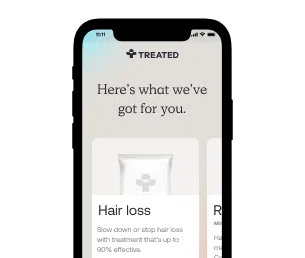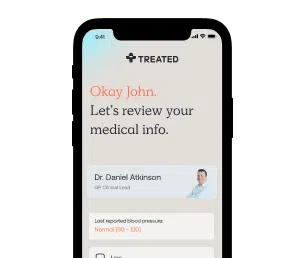Non-diabetic hyperglycaemia
Lower your blood sugar levels with effective treatments.
Secure delivery
UK clinicians
Non-diabetic hyperglycaemia is a condition characterised by raised blood sugar levels, but without any of the other criteria to meet a type 2 diabetes diagnosis.
If you think you might have high blood sugar, chat with your GP and order non-diabetic hyperglycaemia treatment online.
Non-diabetic hyperglycaemia is a condition that causes high blood sugar levels but without any of the other main symptoms or criteria that might lead to a type 2 diabetes diagnosis.
Hyperglycaemia occurs when there is too much sugar in the blood and this can happen when your body isn’t producing enough insulin.
There are certain groups of people who may be more at risk of getting non-diabetic hyperglycaemia. These include:
Non-diabetic hyperglycaemia can be a relatively common condition depending on your age, any other health concerns you have and the health of other close relatives (for instance if a close blood relative such as your mother or father has had a diagnosis of diabetes).
In the UK, it’s estimated to affect about 5 million people but globally there are as many as 352 million people that have non-diabetic hyperglycaemia, which is estimated to be at a prevalence of 7.9% of the world population.

How we source info.
When we present you with stats, data, opinion or a consensus, we’ll tell you where this came from. And we’ll only present data as clinically reliable if it’s come from a reputable source, such as a state or government-funded health body, a peer-reviewed medical journal, or a recognised analytics or data body. Read more in our editorial policy.
Non-diabetic hyperglycaemia can occur due to genetics, but lifestyle factors such as diet and exercise can also play a part in it too. A combination of all of these things can lead to a rise in blood glucose levels over time. This can cause a disruption in the body’s ability to make insulin.
Insulin is what you need to control your blood sugar and keep it steady. Once your body isn’t able to effectively make it, your pancreas (the organ that produces insulin) gets tired which can ramp up your blood sugar levels even more, eventually causing type 2 diabetes.
The symptoms of non-diabetic hyperglycaemia develop over a period of time, but sometimes they can appear very quickly. In some people, there may be no symptoms at all until their blood sugar level becomes very high. The signs to look out for include:
If you think you have more than one or two of these symptoms then it’s probably best to have a catch up with your doctor to get checked over and rule out any other potential health problems.
If the condition isn’t brought under control quickly enough then it can develop into type 2 diabetes. Type 2 diabetes can require more management and lead to other long term health problems, putting you at a higher risk of heart attack, stroke and kidney disease.

How we source info.
When we present you with stats, data, opinion or a consensus, we’ll tell you where this came from. And we’ll only present data as clinically reliable if it’s come from a reputable source, such as a state or government-funded health body, a peer-reviewed medical journal, or a recognised analytics or data body. Read more in our editorial policy.
There are some good treatment options to help get non-diabetic hyperglycaemia under control. Once it’s diagnosed it can be treated with a medication called Metformin.
Metformin is a drug that helps your body regulate its insulin in a much more efficient way. It helps to reduce the levels of sugar that your liver releases into your body.
Alongside treatment with Metformin, the other best options to treat non-diabetic hyperglycaemia are often lifestyle changes such as a healthy diet and more regular exercise. Cutting down on alcohol can offer great benefits too.
In order to prevent the onset of type 2 diabetes, non-diabetic hyperglycaemia always needs treatment. Spotting the signs and symptoms early and seeking medical advice is the best way forward.

How we source info.
When we present you with stats, data, opinion or a consensus, we’ll tell you where this came from. And we’ll only present data as clinically reliable if it’s come from a reputable source, such as a state or government-funded health body, a peer-reviewed medical journal, or a recognised analytics or data body. Read more in our editorial policy.
Have something specific you want to know? Search our info below, or ask our experts a question if you can’t find what you’re looking for.

Like Glucophage, but it lasts longer. Once a day, easy to take tablets.

Easy to take slow release tablets for hyperglycaemia, to help prevent diabetes.

Registered with GMC (No. 4624794)
Meet Daniel
Registered with GPhC (No. 2202465)
Meet Sanjeda
Registered with GPhC (No. 2070724)
Meet Craig
Always read the leaflet that comes with your medication and tell us about any side effects you get.
We know health, but you know you.
Our experts tell you what’s safe, but you decide what’s best.
Answer a few questions and tell us about yourself. Get tailored advice from our clinicians so you can choose better.

Choose your treatment and how often you have it delivered.

We know things change. It’s the nature of life. We’ll check in regularly to make sure your treatment is still right for you.
Pause. Change. Skip. Start again. Any time you like.
Here are some other things we can help with.
Choose from our range of tablets and solutions. Get ongoing care and support from our experts.
Stop smoking treatments that can help you kick the habit forever, and reduce your risk of disease.
Tablets or injections. Tailored weight loss treatments combined with ongoing support from our experts.
We're making healthcare more about you. Sign up to our newsletter for personalised health articles that make a difference.
Disclaimer: The information provided on this page is not a substitute for professional medical advice, diagnosis, or treatment. If you have any questions or concerns about your health, please talk to a doctor.
NHS Diabetes Prevention Programme (NHS DPP) Non-diabetic hyperglycaemia.
Overview. Type 2 diabetes: prevention in people at high risk. NICE.
Global epidemiology of prediabetes - present and future perspectives. Clinical Diabetes and Endocrinology, 5(1).
Treating prediabetes with metformin: systematic review and meta-analysis. Canadian family physician, 55(4), pp.363–9.
We couldn't find what you're looking for.
Here's everything we treat. Or, if you're looking for something we don't have yet, you can suggest something.
If there’s a particular treatment or condition you’re looking for, tell us and we’ll look into it for you.
Submit your question here, or tell us if you’ve found an issue on our site.
We’ll get back to you very soon. We aim to respond to all queries in one working day.
You’re signed up to our newsletter. Keep an eye on your inbox for our latest update.
By clicking 'Subscribe now' you're agreeing to our Privacy Policy.
We’ve sent you an email asking you to confirm your email address.